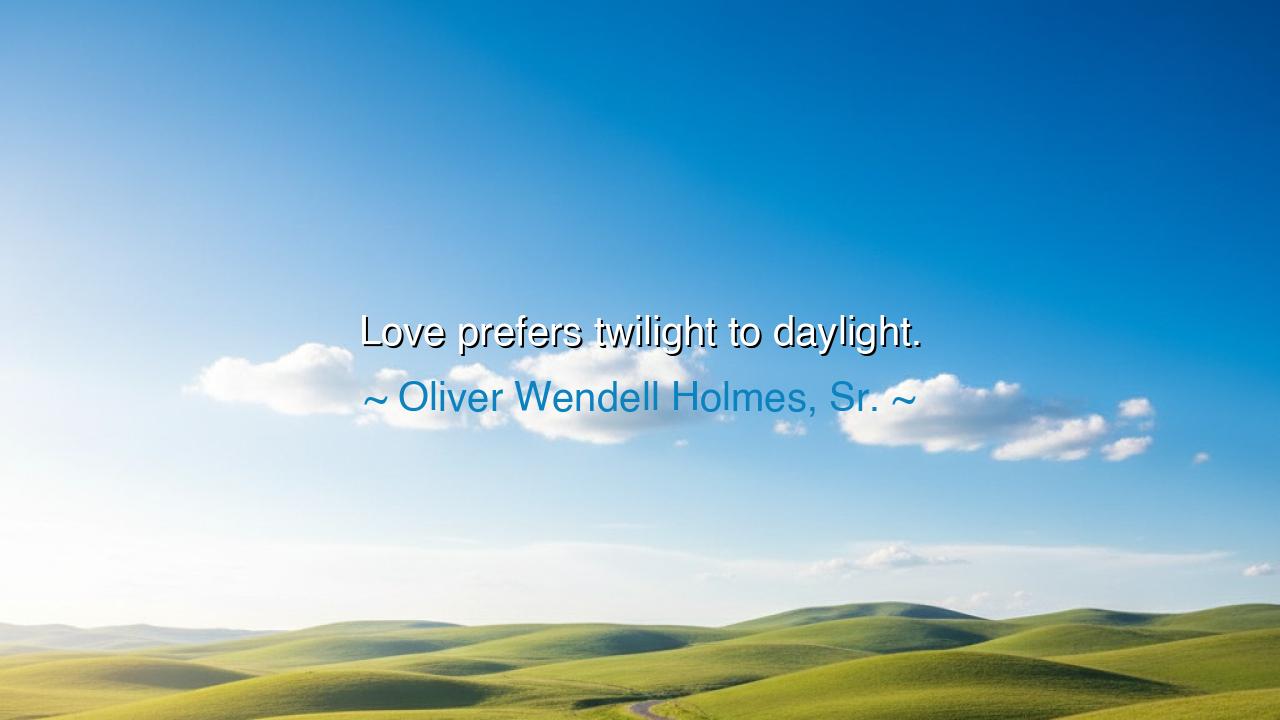
Love prefers twilight to daylight.






“Love prefers twilight to daylight.” — Oliver Wendell Holmes, Sr.
In this tender and timeless reflection, Oliver Wendell Holmes, Sr., the poet, philosopher, and healer of the human soul, reveals a profound truth about the nature of love. Twilight — that sacred hour between day and night — is neither dazzling like noon nor dark like midnight. It is a time of softness, of mystery, of calm. And so Holmes tells us that love, too, thrives not in the glaring light of scrutiny or the harsh glare of reason, but in the gentle glow of intimacy and subtlety. Love prefers twilight, for in twilight, the heart sees what the eyes cannot.
Holmes lived in the 19th century, an age of both science and sentiment, where reason and emotion often clashed. Yet he, a physician as well as a poet, understood that love belongs to neither the intellect nor the senses alone. He saw that love dwells best in the half-light — where mystery still breathes, where the soul has room to dream. Daylight, with all its exposure and precision, belongs to the world of analysis, of judgment, of things named and measured. Twilight, however, belongs to feeling, to faith, to the ineffable communion of hearts. In love, as in twilight, we do not seek to see everything clearly — we seek instead to feel the truth that lies beneath appearance.
Consider the ancient lovers Tristan and Isolde, whose story has echoed through the centuries. Their love was born not under the sun’s proud blaze, but beneath the shadow of secrecy and longing. It was in the twilight of forbidden affection that their souls found union — a love both tragic and transcendent. To them, daylight meant exposure, judgment, and doom; twilight meant freedom, tenderness, and truth. Thus, Holmes’s words remind us that love, in its purest form, seeks not spectacle, but depth — not the crowd’s applause, but the quiet understanding between two hearts that need no witness.
There is wisdom, too, in the twilight’s gentleness. The heart cannot bear constant brilliance; it needs shade to rest, as flowers close their petals when the sun is too strong. Love, when forced to live always in daylight — examined, measured, and displayed — begins to fade. It becomes performance instead of prayer. The twilight allows love to breathe, to remain sacred, to belong to the lovers alone. In that hush of dim light, words grow softer, glances grow longer, and the soul, unguarded, speaks in silence.
Yet Holmes’s metaphor reaches even deeper. Twilight is the meeting of opposites — light and dark, known and unknown. So too is love, which binds joy to sorrow, passion to peace, body to spirit. To prefer twilight is to accept love as it truly is — a union of contradictions. It is to cherish both the ecstasy and the ache, the closeness and the distance, the beauty and the uncertainty. Only the shallow heart demands love to be bright and simple. The wise heart welcomes its shadows, knowing that even pain glows softly in love’s dusk.
We may see this truth in the quiet devotion of Eleanor Roosevelt, who loved her husband Franklin despite the sorrows and complexities of their marriage. Theirs was not a love of constant sunlight, but one of enduring twilight — tested, imperfect, yet steadfast. In that softer realm, she found space for forgiveness, loyalty, and grace. Her love, like the evening sky, was not dazzling but deep — colored with the hues of endurance, compassion, and understanding.
Therefore, O seeker of truth, learn from Holmes’s wisdom: do not demand that love always live in the daylight. Do not seek to explain it, display it, or master it. Let it dwell where it chooses — in quiet moments, in mystery, in the hush of shared glances and unspoken trust. For love that survives the twilight’s dimness is the love that endures beyond all days.
And so, remember this teaching: the truest love lives not in the blinding sun of perfection, but in the twilight of tenderness — where souls touch, unseen, and find rest in each other’s light. Nurture your love in gentleness, protect it from harshness, and let its mystery remain sacred. For when daylight fades, and all the world grows still, it is only love — tender, quiet, eternal — that glows on the horizon of the heart.






AAdministratorAdministrator
Welcome, honored guests. Please leave a comment, we will respond soon